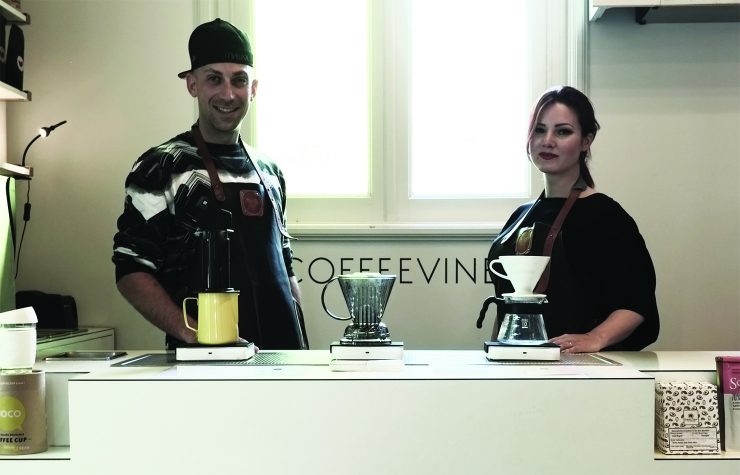
Drama, naturally, abounds in the Stadsschouwburg, Amsterdam’s “city theater,” as its name means in Dutch. But in the lobby’s high-ceilinged antechamber, which long served as a metropolitan box office, it was all business back in the day. Thrilled to nab tickets for a stadium rock show? Smug to swing half-off for a that-night ballet? It didn’t matter: a queuer’s excitement was always quashed by ticket agents so clinical in how they took an order, and so anticlimactic in their perforation of the printed slip.
But, nowadays, tickets are sold online and, as of July, this repurposed space is producing both drama and business. Felicia is a four-company collective of food and drink entrepreneurs who have each taken up shop in one corner of the room. Fresh fruit sorbet, molecular ice cream, cold-pressed juice—the concoctions are timely and toothsome. Sprudge, however, is shining a spotlight on the initiative set to become a four-seasons favorite for the masses passing through one of the Dutch capital’s busiest squares.
Cue The Coffeevine Bar.
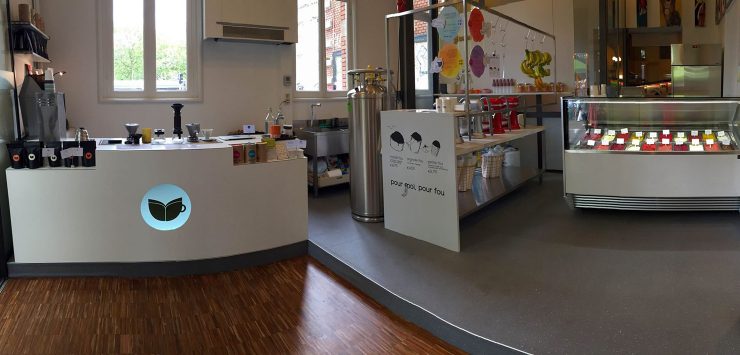
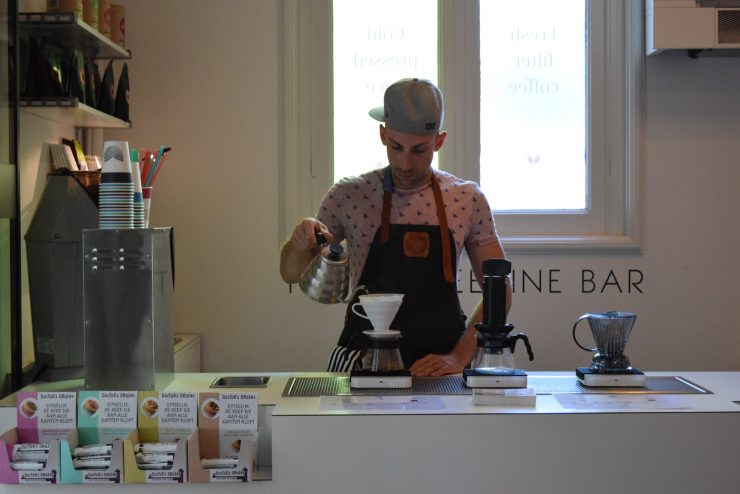
Yes, it is a coffee bar. No, an espresso machine is not in sight. All the coffee here is prepared with an apparatus requiring a filter: an AeroPress, a Clever, or a V60. This is Amsterdam’s first filter bar. It is likely also the only venue in the Netherlands so singularly devoted to slow coffee. And it is one of the very few—maybe two, some experts posit—filter-only coffee bars on the continent.
The philosophy behind the bar is the same that led owner Alex Kitain to begin the Coffeevine blog three years ago and, together with his business partner Erica Armistead, to found their connected coffee subscription service one year ago. Everything the pair does is based on a belief that everyone should be privy to quality coffee, and that the berry-to-brew story, with all its protagonists and minor players, deserves to be told in full.
As Kitain puts it: “By offering people an opportunity to subscribe to a coffee box, you can still deliver great coffee to people no matter where they live,” even if that’s, he suggests, “a really small village somewhere.”
The bar, then, in not a small village at all, beckons those who may know the Coffeevine just by URL, not IRL. “It’s business now to have a brick and mortar version of what you’re doing online, so people can actually see and feel the physical product,” explains Armistead. She urges, “Come in, meet us, see what we’re doing. Try it.”
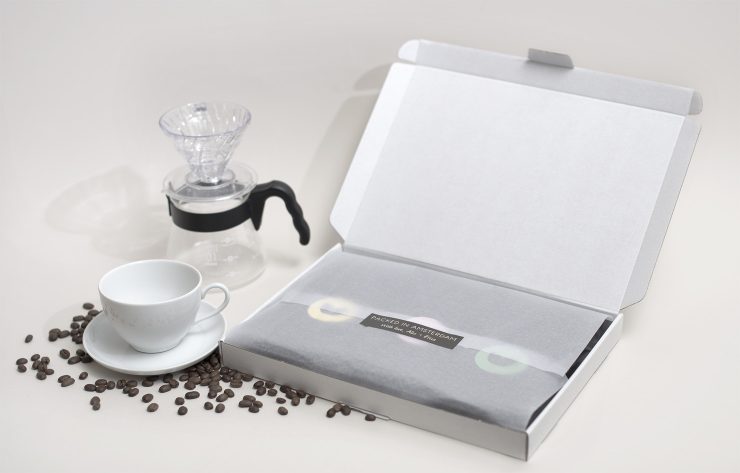
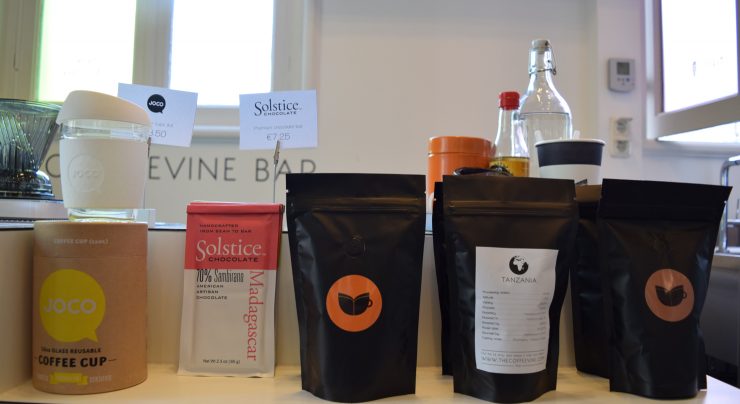
Mirroring the contents of the Coffeevine subscription service, the bar serves a new trio of coffees each month. A recent menu listed a Kenya roasted by Man Versus Machine, a Costa Rica by Nømad Coffee, and a Rwanda by Stooker Roasting Company. But there are impromptu creations too, such as a cold brew of The Barn’s Nano Challa mixed with elderflower tonic.
The Coffeevine in real life, moreover, does what its suppliers may not consistently be able to. “A lot of the roasteries, they’re trying to push filter. But it’s difficult when you have a lot of customers waiting, to make lots of filter coffees,” says Kitain, adding that he was inspired by Blue Bottle in Brooklyn. “They had 15 filter coffees going at one time and there was a queue all around the block waiting for their morning coffee.”
Born in Mexico, raised in Germany, schooled in the UK, and introduced to a French press in Seattle, the quadrilingual Kitain applies his international marketing experience to run Coffeevine’s daily operations and organization. It was in Amsterdam that he met Armistead, a half-British, half-Californian graphic designer who is also the company’s creative side.
The duo is discerning—the pair and recruited panel-mates regularly conduct blind tastings to determine which beans get selected, worthy of being swaddled in packaging fit to titillate Tyler Brûlé. But Kitain and Armistead are not snobs. They both credit Starbucks for exposing their young tongues to specialty coffee and smilingly recount the cinnamon-dusted paths that preceded the “penny drop moment” of discovering filter.
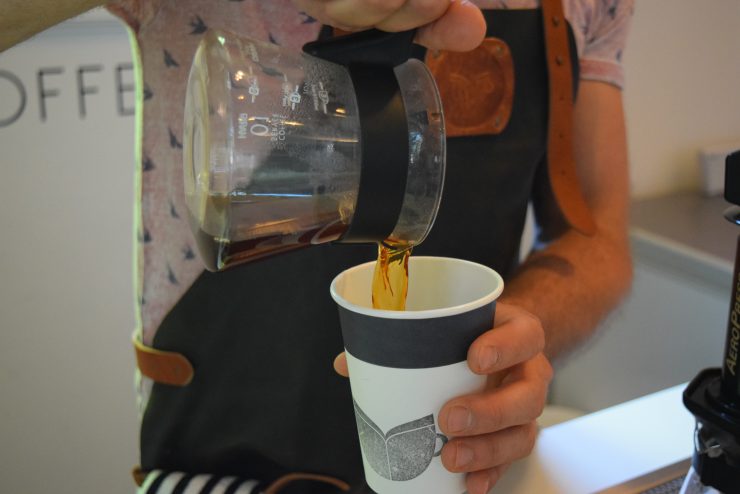
So not as tastemakers but taste-guiders, The Coffeevine Bar is providing that possibility for a whole new clientele. Says Kitain, “Because it’s such a theatrical, monumental building, you attract a slightly different audience. You actually get a lot of theater visitors who are coming in here. They’re curious, they’re willing to try something, but they’re not familiar with this sort of coffee.”
At present, Felicia has no seating, though this is fine because everything sold by the collective is prepared to-go. The Coffeevine Bar, however, tempts visitors to stand around, watching the performance of a pour-over. And for those who stay, it’s OK to show emotion. Unlike the ticket rippers of yore, the barista is most empathetic.
The Coffeevine Bar is located at Leidseplein 26, Amsterdam.
Karina Hof is a freelance journalist based in Amsterdam. Read more Karina Hof on Sprudge.
Additional images courtesy Felicia and The Coffeevine.
The post Amsterdam’s Hottest New Cafe Is The Coffeevine Bar appeared first on Sprudge.

